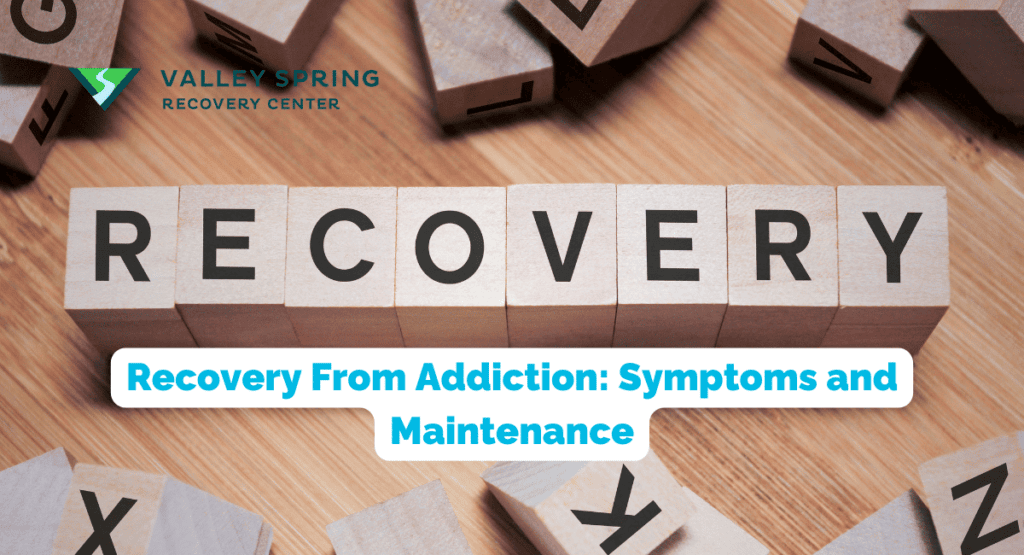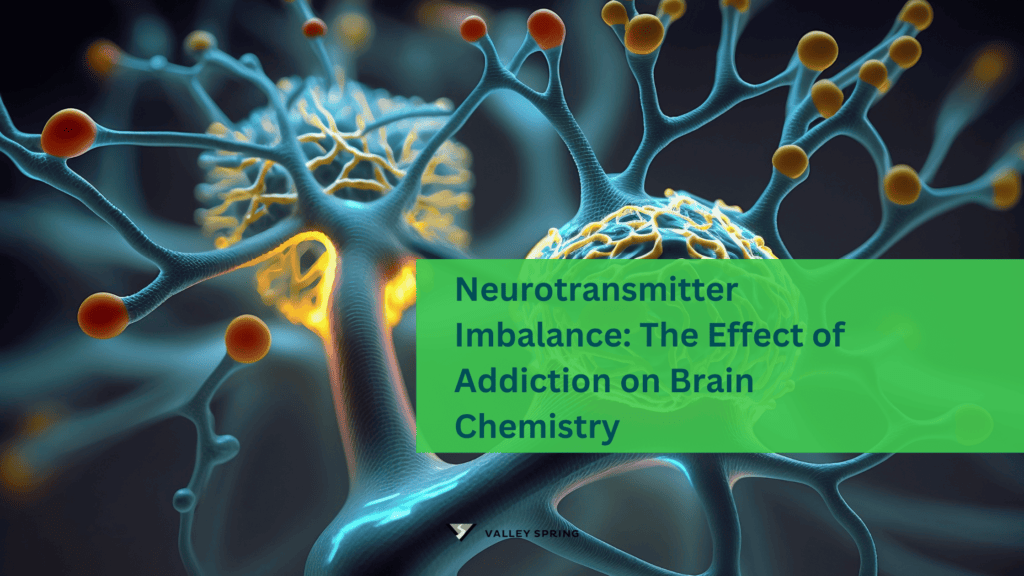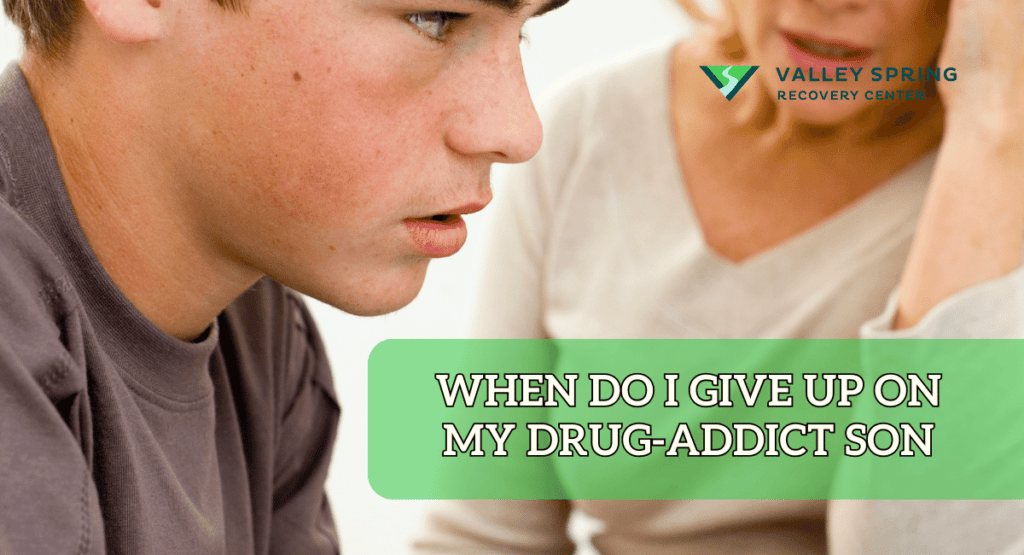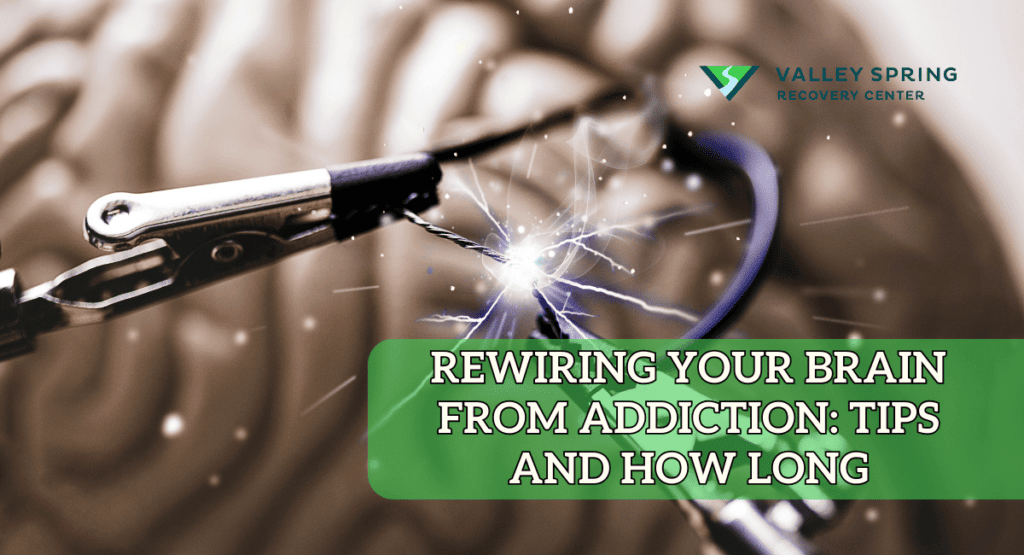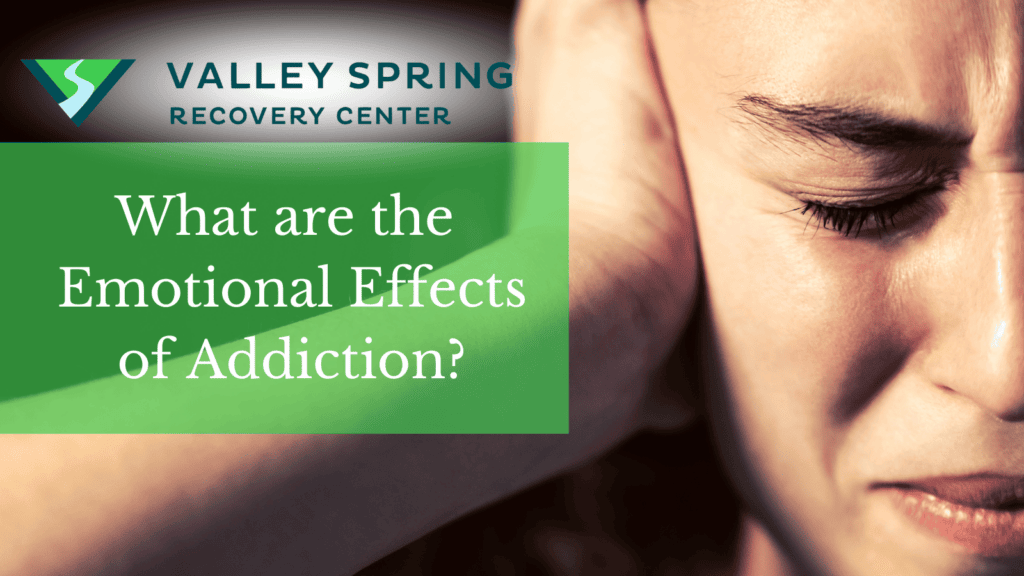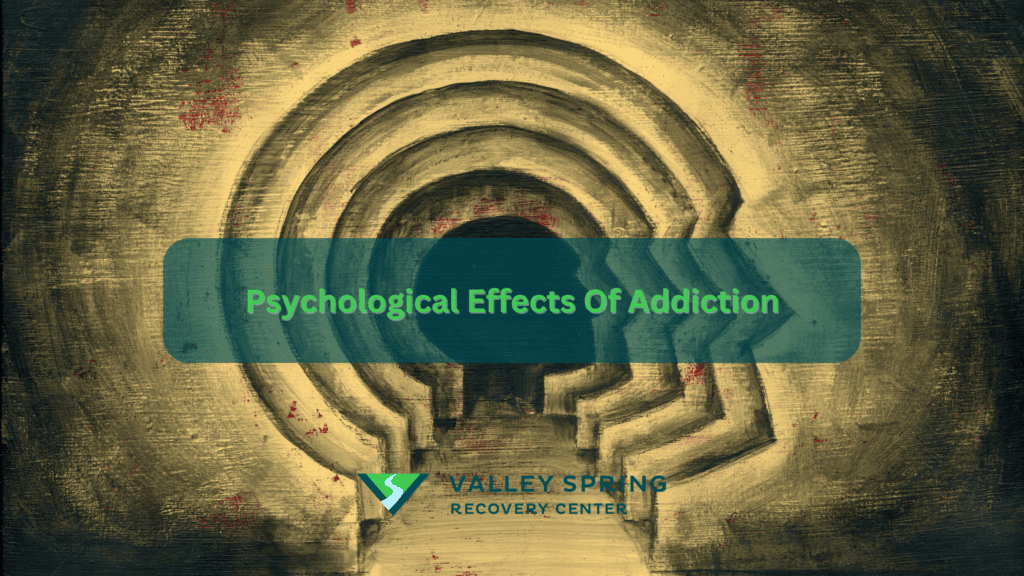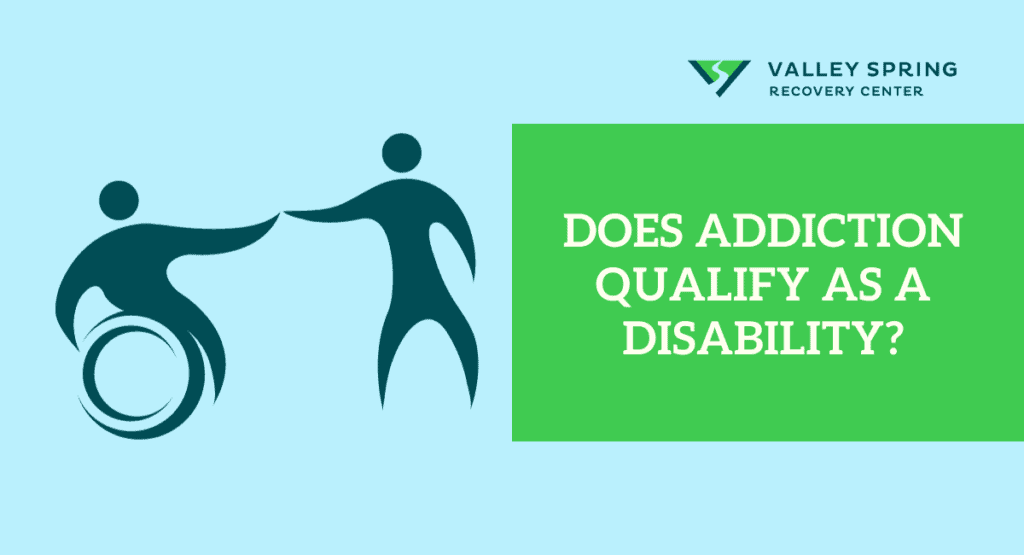Recovery from addiction is a journey of transformation, resilience, and hope. It is a path that millions of individuals worldwide embark upon, seeking to reclaim their lives from the clutches of substance abuse. This journey is marked by distinctive symptoms and indicators that signify progress and healing.
From the initial steps of acknowledging the problem (drug addiction) to the ongoing maintenance required for long-term sobriety, the recovery process is multifaceted and deeply personal. Although recovery is possible, the factors that influence it can depend on the type of drug and duration of abuse, treatment methods, the individual’s attitude toward recovery, and more.
What is Drug Addiction?
Drug addiction, also known as substance use disorder, is a chronic and complex condition characterized by the compulsive and often harmful behavior of seeking and using drugs, despite adverse side effects and negative consequences. Drug addicts experience an intense, uncontrollable craving for the drug, coupled with a loss of control over its use and withdrawal symptoms when not using the drug.
Addiction can profoundly impact a person’s physical and mental health, relationships, and overall well-being. It usually begins with drug experimentation, which can lead to abuse, tolerance, dependence, and full-blown addiction, known as the drug addiction cycle. Individuals in the drug addiction cycle may require early intervention, treatment, and ongoing support to break the cycle and maintain wholesome recovery.
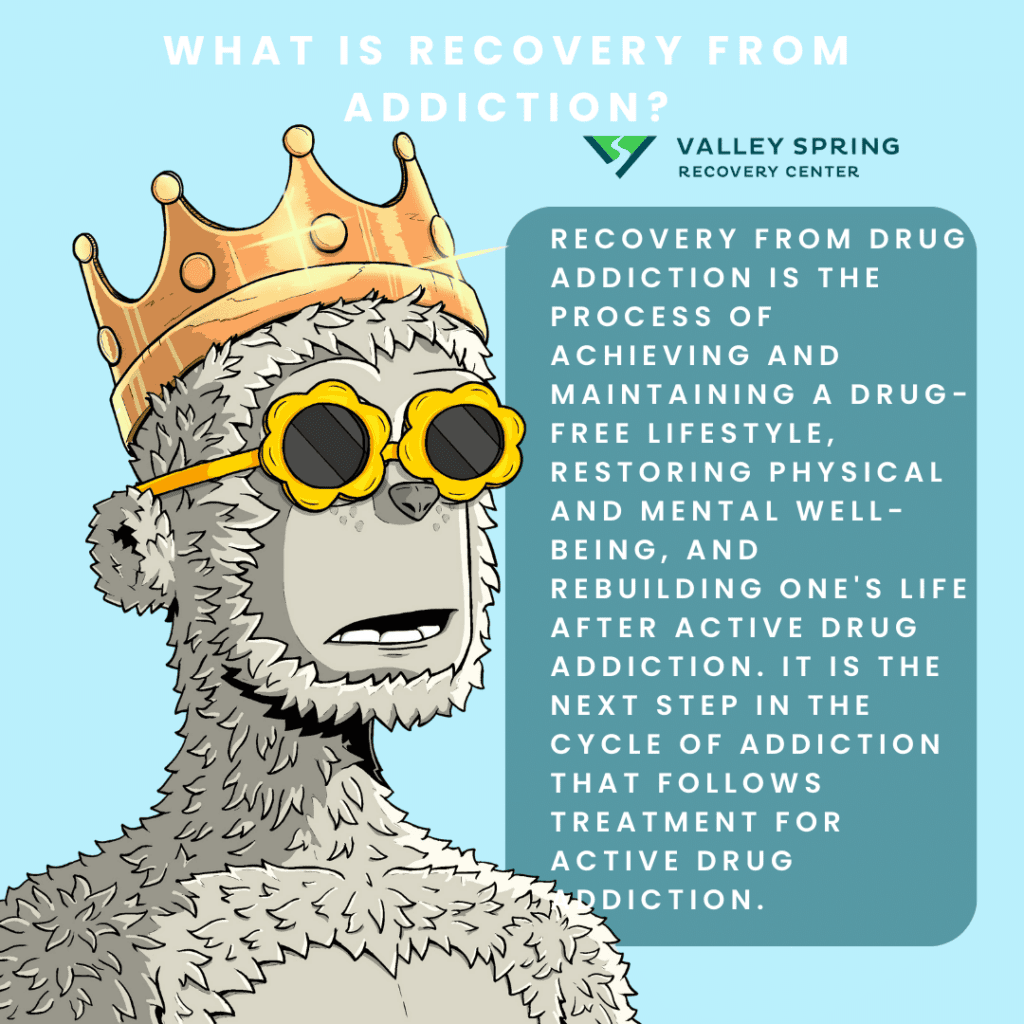
What is Recovery from Drug Addiction?
Recovery from drug addiction is the process of achieving and maintaining a drug-free lifestyle, restoring physical and mental well-being, and rebuilding one’s life after active drug addiction. It is the next step in the cycle of addiction that follows treatment for active drug addiction.
Recovery involves action and maintenance of a care plan that addresses physical, psychological, and social aspects so that relapse does not occur. Recovery is more than the absence of drug use and represents a state of sobriety where the once-addicted individual is focused on personal growth, establishing healthy coping mechanisms, and developing a support system to sustain long-term sobriety. Being recovered is the opposite of being addicted. Someone can not be recovered or sober and be addicted at the same time.
What are the Five Stages of Addiction Recovery?
There’s a fundamental distinction between the stages of recovery and the phases of addiction itself. While the phases of addiction lead individuals down a path of substance dependency, the stages of addiction recovery illuminate a separate journey of healing, transformation, and restoration.
According to the Recovery Research Institute, there are five primary stages of addiction recovery, including:
- Pre-Contemplation: In this initial stage, individuals may be in denial or lack awareness of the negative consequences of their substance use.
- Contemplation: Individuals in this stage begin to acknowledge their addiction, weigh the pros and cons of recovery, and explore treatment options.
- Preparation: In the preparation stage, they become actively ready for change by setting a quit date, seeking treatment, and making concrete plans to address their addiction.
- Action: This is the stage of active change and recovery, where individuals take definitive steps to address their addiction by participating in treatment, therapy, support groups, and lifestyle changes.
- Maintenance: Once individuals have recovered, the maintenance stage involves lifelong, ongoing efforts to sustain abstinence, develop healthy coping mechanisms, and prevent relapse.
How Common is Recovery from Drug Abuse?
Not everyone who abuses or is addicted to drugs achieves or even goes through recovery. However, most drug addicts go through the recovery process. According to the Substance Abuse and Mental Health Services Administration (SAMHSA), 9.2% of adults in the United States (approximately 23.5 million of the 35.2 million people addicted to drugs) reported recovering from a substance use disorder in 2019.
From another SAMHSA study, more than 45% of people who participated in drug rehab and treatments saw it through and moved on to ongoing recovery.
How Long Does It Take The Brain To Recover From Drug Addiction?
The timeline for brain recovery from drug addiction can vary widely depending on the substance, duration of use, and individual factors. However, there is scientific evidence to suggest that the brain does have the capacity to recover. According to a study by Volkow et al. in 2001, imaging scans show significant differences in the brains of methamphetamine users compared to healthy individuals. After one month of abstinence, the brain still appears altered, particularly in the dopamine transporter levels (DAT) in the reward region. Notably, after 14 months of abstinence, these DAT levels return to nearly normal function, suggesting that the brain’s reward system is capable of substantial recovery. Therefore, while immediate recovery is unlikely, prolonged abstinence can lead to significant improvements in brain function.
What Happens in the Brain During Recovery from Addiction?
During ongoing recovery from addiction, various changes occur in the brain due to sustained abstinence from drugs. These changes reflect the brain’s capacity to heal and adapt over time. They can include:
1. Neuroplasticity
The brain’s ability to reorganize and form new connections, known as neuroplasticity, plays a crucial role in recovery. With drug abstinence, the brain can gradually restore and rewire neural pathways disrupted by addiction. This rewiring process helps to regain normal brain function and reduce the impact of drug-related changes.
2. Dopamine system normalization
Drug addiction often disrupts the brain’s dopamine system, which involves motivation, reward, and pleasure. During recovery, the brain strives to restore a healthier balance of dopamine activity. Over time, the brain’s reward system can become less dependent on drugs and respond to natural, healthy rewards, such as social interaction or engaging in enjoyable activities.
3. Reduction in cravings
With continued abstinence, the intensity and frequency of drug cravings tend to diminish. The brain’s reward circuitry undergoes changes that result in a reduced craving response to drug-related cues. This reduction in cravings is associated with improvements in impulse control and decision-making.
4. Cognitive function restoration
As individuals remain in recovery, there is evidence of cognitive recovery and improvements in memory, attention, and executive functioning. The brain’s ability to process information, make decisions, and regulate behavior can gradually return to normal or near-normal levels.
5. Emotional regulation improvement
During recovery, the brain’s emotional regulation systems can begin to stabilize. Individuals may experience enhanced emotional resilience, improved mood regulation, and greater control over impulsive emotional responses.
6. Stress response normalization
Chronic drug use can dysregulate the brain’s stress response system, leading to heightened stress levels and an increased vulnerability to relapse. The brain’s stress response system can gradually recalibrate through ongoing recovery, resulting in a more balanced and adaptive response to stressors.
These brain changes occur gradually and can be influenced by the duration and intensity of drug use, co-occurring mental health conditions, and the effectiveness of treatment and support received during recovery.
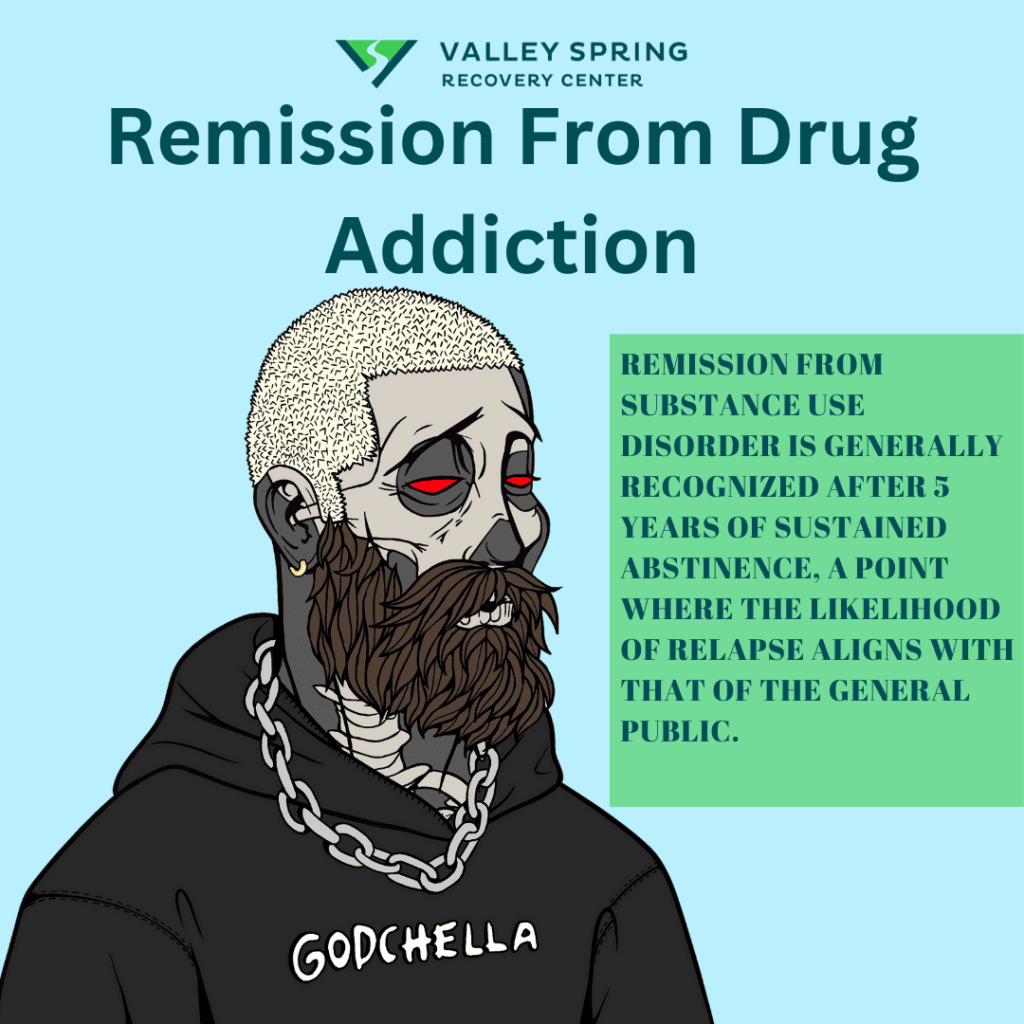
How Long Does It Take To Be Considered in Remission From Drug Addiction and Be Fully Recovered?
Remission from substance use disorder is generally recognized after 5 years of sustained abstinence, a point where the likelihood of relapse aligns with that of the general public. Consequently, ongoing care and support should not be limited to the initial days or months of recovery but extended for years to sustain this remission effectively.
However, it’s important to note that even after reaching this important recovery milestone, ongoing care and support remain crucial. The risk of relapse is a persistent concern, not just in the days or months following cessation but for years thereafter. Therefore, it’s advisable to continue with follow-up care, regular check-ins with healthcare providers, and possibly ongoing therapy or support group attendance even after the 5-year mark.

What are the Signs and Symptoms of Recovery?
The signs and symptoms of recovery are listed below:
- Abstinence from drug use
- Improved physical health
- Improved mood and emotional stability
- Emotional stability
- Enhanced relationships
- Personal growth and self-improvement
- A strong commitment to sobriety
- Reduced cravings for the drug of abuse
- Improved self-esteem and confidence
- A sense of purpose and hope for the future
- Relapse prevention skills
- Community engagement and support
- Improved overall well-being
Although the signs and symptoms of ongoing recovery may manifest differently for each person, they generally indicate progress, growth, and the ability to maintain a drug-free and fulfilling life.

What are Some Common Challenges People Face During the Recovery Process?
Some of the challenges people face during recovery are normal and will differ for each person. Challenges can include the following:
- Withdrawal symptoms: Managing withdrawal symptoms can be challenging during the early stages of recovery, as they can be physically and psychologically uncomfortable. These symptoms can include nausea, sweating, anxiety, depression, insomnia, and cravings.
- Cravings and triggers: Cravings for drugs can persist even after the acute withdrawal phase. Triggers, such as people, places, or situations associated with past drug use, can evoke intense cravings and tempt you to relapse.
- Relapse: Relapse is a common challenge in the recovery process, which can occur due to various factors, including triggers, stress, social pressures, or a lack of effective coping strategies.
- Emotional and psychological issues: Individuals in recovery may face challenges related to depression, anxiety, post-traumatic stress disorder (PTSD), or other emotional and psychological problems.
- Stigma and social pressures: Overcoming societal stigma and navigating social pressures to use drugs again can be challenging, as these can lead to feelings of shame, isolation, and discrimination.
- Creating a new identity and lifestyle: Recovery involves making significant lifestyle changes. Individuals may need to distance themselves from environments and social circles associated with drug use.
- Finance: Addiction is expensive and can leave a lasting impact on individuals that get sober. Many times the recovering individual will be in dept or have other financial difficulties that linger as a result of the time spent in acive addiction.
- Relationships: Relationships are often times damaged or strained during active addiction. This is something that has to be dealt with during recovery and can be a common trigger for relapse.
These challenges are common, and seeking support from healthcare professionals, counselors, support groups, and loved ones can help you overcome these obstacles and maintain long-term recovery.
How Does Recovery Affect Relationships?
Recovery can have a profound impact on personal relationships. While some relationships may improve as you regain control over your life, others, particularly those that revolve around substance use, may end. Open communication and relationship counseling can help navigate these changes. Fixing relationships affected by addiction is sometimes possible when the recovering individual admits their wrongs and makes a commitment to fix them. Repenting for past wrongs and making them right is also a key step defined in the 12 steps of AA or NA in the 9th step. The 9th step as defined in alcoholics anonymous is “Make direct amends to such people wherever possible, except when to do so would injure them or others.”

How Can Drug Abusers Maintain a Drug-Free Life and Fully Recovery?
Recovery from addiction is possible when formerly addicted individuals utilize various coping mechanisms and relapse prevention strategies to support their journey toward sustained sobriety. The most effective recovery methods are listed below:
1. Developing a support network
Building a support network of people who understand and support your recovery can be invaluable. This network may include friends, family members, support groups, sponsors, or mentors who provide encouragement, guidance, and accountability.
2. Engaging in therapy or counseling
Individual or group therapy can help you address underlying issues that may have contributed to your addiction. Therapy provides a safe space to explore emotions, learn coping skills, and develop healthier ways of managing stress and triggers.
3. Practicing stress management techniques
Stress is a common trigger for relapse. Learning and implementing stress management techniques such as deep breathing exercises, mindfulness meditation, yoga, regular exercise, and engaging in hobbies or activities that promote relaxation can be beneficial.
4. Identifying and avoiding triggers
You must identify triggers that may lead to drug use and take steps to avoid or manage them. This may involve avoiding specific people, places, or situations associated with drug use or developing coping strategies to navigate triggers effectively.
5. Creating a structured routine
Establishing a structured daily routine can provide stability and reduce the likelihood of boredom or idle time, which can be risky for you in recovery. Having a schedule that includes healthy activities, work or school commitments, exercise, social interactions, and self-care can help you maintain focus and purpose.
6. Developing healthy coping mechanisms
Engaging in healthy coping mechanisms is essential to replace drug use to deal with stress or difficult emotions. This may involve practicing self-care, engaging in creative outlets, journaling, practicing relaxation techniques, or seeking support from peers or professionals during challenging times.
7. Setting realistic goals
Setting realistic and achievable goals in recovery can provide a sense of purpose and direction. Breaking down larger goals into smaller, manageable steps can boost your motivation and give you a sense of accomplishment.
8. Building resilience
Resilience is the ability to bounce back from setbacks. Developing resilience involves cultivating a positive mindset, practicing self-compassion, learning from past mistakes, and embracing a growth-oriented perspective. Resilience helps you navigate challenges and setbacks without turning to drugs.
9. Continuing education and skill-building
Engaging in ongoing education, skill-building, or vocational training can enhance self-esteem, provide opportunities for personal and professional growth, and increase employability. Expanding knowledge and acquiring new skills can create a sense of purpose and open doors to a drug-free and fulfilling life.
What Does the Recovery Process from Drug Tolerance Involve?
The recovery process from drug tolerance typically involves a medical evaluation, a detoxification phase, and often, behavioral therapy. The objective is to reset the body’s response to the substance and, if applicable, treat any underlying dependency or addiction issues. Medication may also be used to manage withdrawal symptoms and cravings.
If you or a loved one are experiencing drug tolerance and dependence, it’s crucial to consult healthcare providers for a tailored treatment plan. This could involve tapering off the medication under supervision, engaging in cognitive-behavioral therapy, or potentially using medications like methadone or buprenorphine for opioid tolerance and dependency.
What does it mean to be sober in the context of recovery from addiction?
Recovery and sobriety can be used synonymously in the context of addiction and represent a return to a normal state of health, mind, or strength. Addiction is a chronic relapsing disease, which means once an individual has reached the active addiction stage in the addiction cycle, they are always prone to returning to the state of addiction. Sobriety is different than abstinence and is used as an action word that shows the addicted individual is not only abstinent but engaging in ongoing maintenance and continuing a treatment protocol so they remain in a healthy state of mind and overall health whereas abstinence is used as a word that implies that ongoing drug use is not present.
How Do You Maintain Long-Term Sobriety and Recovery?
Maintaining long-term sobriety often involves a combination of ongoing therapy, medication, and lifestyle changes. Many people continue to attend support group meetings and engage in other forms of aftercare to stay focused on their recovery goals.
What Factors Influence Holistic Recovery from Drug Addiction?
The factors that influence holistic recovery from drug addiction include the following:
- Personal motivation and readiness for change
- Supportive social network
- Access to professional help and treatment
- Effectiveness in addressing underlying issues
- Development of coping skills and relapse prevention strategies
- Healthy lifestyle changes
- Continued support and aftercare
- Positive coping mechanisms and meaningful activities:
- Self-care and self-compassion
- Resilience and perseverance
Although everyone’s recovery journey is unique, individuals with the above characteristics and support will respond to treatment and recover faster. Additionally, a comprehensive and individualized approach to recovery that addresses these factors is crucial for supporting a wholesome and long-lasting recovery from drug addiction.
Can Drug Addiction Be Cured?
According to the National Institute on Drug Abuse, Like treatment for other chronic diseases such as heart disease or asthma, addiction treatment is not a cure but a way of managing the condition. Treatment enables people to counteract addiction’s disruptive effects on their brain and behavior and regain control of their lives.
Does Relapse to Drug Use Mean Treatment Has Failed?
No, relapse does not signify failure or indicate that recovery is impossible. It is a setback that can be used as an opportunity for learning and growth. Many individuals who experience a relapse can recommit to their recovery and continue their journey toward sustained sobriety.
Will Everyone in Ongoing Recovery Experience a Relapse?
No, not everyone in ongoing recovery from drug addiction experiences a relapse. The likelihood of relapse can vary depending on the individual’s level of commitment to recovery, the presence of underlying issues, the effectiveness of their support system, and the implementation of relapse prevention strategies.
How Can Co-Occurring Mental Health Conditions Affect The Extent And Speed Of Recovery?
Co-occurring mental health conditions, also called dual diagnosis or comorbidity, can significantly impact the extent and speed of recovery from addiction. When individuals have both an addiction and a mental health disorder, both conditions need to be addressed simultaneously for adequate recovery. Integrated treatment approaches that target both addiction and mental health are often necessary.
Substance abuse may also worsen symptoms of mental health disorders, while mental health symptoms can contribute to substance use as a form of self-medication. This mutual influence can create a cycle of relapse and hinder the recovery process. If the mental health condition remains untreated or is not effectively managed, the associated symptoms, such as depression, anxiety, or mood swings, can trigger substance use.
In cases where medication is part of the treatment plan for a mental health condition, healthcare providers need to evaluate the risks and benefits of medications and coordinate treatment to minimize potential conflicts and optimize recovery outcomes.
Additionally, co-occurring mental health conditions can impact an individual’s motivation, engagement, and adherence to treatment. The symptoms of mental health disorders may affect an individual’s willingness to participate in treatment activities, follow through with recommendations, or maintain consistency in recovery efforts. Collaborative care between addiction specialists and mental health professionals is crucial for effectively managing and treating co-occurring conditions.
Why do some addicts reject recovery and continue using drugs?
Some addicts may reject recovery and continue with drug use for many reasons, the most common of which is denial. If an addict does not accept the full scope and severity of their disease and agree to proceed forward with a treatment plan, recovery usually does not occur. Denial can serve as a defense mechanism, preventing them from seeking help or acknowledging the need for change.
Additionally, the physical and psychological dependence that often accompanies addiction can make quitting drugs an incredibly daunting and scary task. Withdrawal symptoms and intense cravings associated with dependence can override the individual’s desire for recovery, leading to continued use and lots of excuses to justify their behavior so they can continue using.
Co-occurring mental health disorders can further complicate the situation, as people may use drugs to cope with emotional pain. Environmental factors, such as living in areas with high drug use rates or having a social circle that encourages substance use, can also perpetuate addiction. Stigma, fear, and past relapses may further deter individuals from pursuing recovery.
Can You Recover Without Professional Help or Drug Rehab?
While some individuals claim to have recovered from addiction without professional help, it’s generally recommended to seek the guidance of healthcare providers for a structured and effective recovery plan. This often includes medication, behavioral therapy, and long-term aftercare.
Attending a drug and alcohol rehab center is a proven to to help recover from addiction. For instance, Valley Spring Recovery Center is a Drug and alcohol rehab center in NJ that treats patients struggling with addiction and has regular meetings with alumni who have been sober for over a year.
What Role Do Support Groups Play in Recovery?
Support groups like Alcoholics Anonymous (AA) or Narcotics Anonymous (NA) can play a significant role in recovery by providing a community of individuals who understand the challenges of addiction. These groups offer emotional support, practical advice, and a sense of accountability that can be invaluable in maintaining sobriety.
How Do You Deal with Relapse in Recovery?
Relapse is a common part of the recovery journey and should not be viewed as a failure. Instead, it’s an opportunity to reassess and adjust your recovery plan. Many people seek additional treatment or modify their aftercare program after a relapse.
What Are Common Triggers for Relapse that ruin recovery?
The common relapse triggers include stress, exposure to the substance of abuse, and social situations where substance use is normalized. Identifying and learning how to manage these triggers is a crucial part of recovery maintenance.
How do varying levels of addiction severity impact the approach to recovery, and what options are available for each level?
The approach to recovery is often directly influenced by the severity of the addiction, which can be categorized into mild, moderate, and severe. Each level requires a tailored treatment plan:
- Mild Addiction: Mild addiction is usually considered to be in between the stage of experimentation and abuse, this level of addiction is appropriate to be treated in outpatient treatment and counseling may be effective. The focus is often on education and behavioral interventions to prevent progression to more severe addiction and can be performed in an outpatient rehab setting or virtually through telehealth addiction treatment.
- Moderate Addiction: This level of addiction is categorized when tolerance and dependence on drugs start to develop and usually require more intensive treatment, possibly including partial hospitalization programs or intensive outpatient programs. Medication-assisted treatment may be introduced, along with cognitive-behavioral therapy.
- Severe Addiction: Often necessitates inpatient detox and long-term residential treatment. The approach is multi-faceted, involving medical, psychological, and social support, sometimes including medication to alleviate withdrawal symptoms and cravings.
Regardless of the severity, ongoing aftercare and support are crucial for all levels to maintain long-term recovery. The aim is to equip individuals with the skills and support systems to manage their addiction effectively, minimizing the risk of relapse.
Where is the best place to start the recovery Process?
There are different types of rehab centers that specialize in different types of addiction and co-occurring health disorders and also cater to certain demographics of the addicted population such as lgbtq focused centers, luxury rehab centers, and state-sponsored recovery centers. If you are just starting on the road to recovery, the admissions counselors at Valley Spring Recovery Center can help guide you through the process from detox to intensive outpatient treatment in New Jersey.
Ben Fisher
All author postsShare This Post

